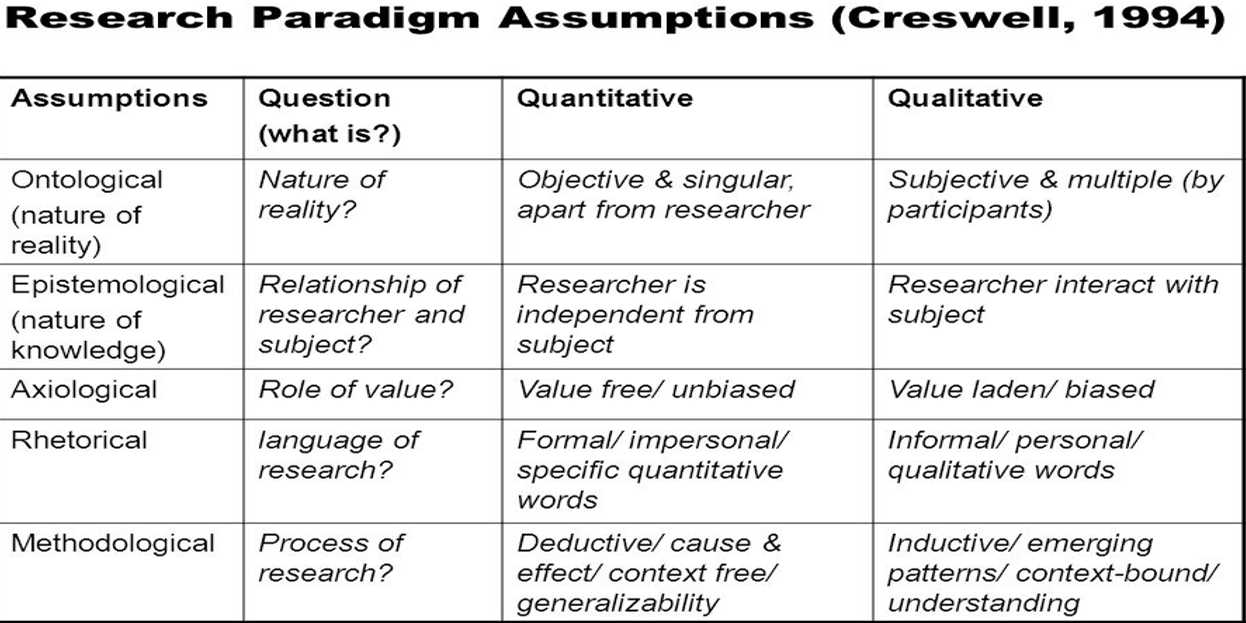10 Fundamentals
Definition (#f7aeae)
Important (#edcae9)
Extra (#fffe9d)
Qualitative Research consists of a wide variety of approaches and methods for the study of natural social life.
The information or data collected and analyzed is nonquantitative, consisting of textual materials such as interview transcripts, fieldnotes and documents, or visual materials like photographs and video recordings.
It documents human experiences about others or one’s self in social action and reflexive states.
Goals:
Outcomes are composed of essential representation and presentation of findings, including:
Documentation of cultural observation.
New insights and understandings about individuals and social complexity.
Evaluation of the effectiveness of programs or policies.
Artistic renderings of human meanings.
The critique of existing social orders and initiation of social justice.
Fundamentals of Qualitative Research:
1) Meaning not Numbers:
Systematically gathered data is a dependable method of understanding what users need, why problems occur and how to solve them.
Goal is to understand the nature of a problem in detail.
Researchers can identify problems that a population face/struggles with the goal of understanding and fixing the problem.
2) Doesn’t Provide a Single Answer:
Qualitative research is used to gain an understanding of underlying, reasons, opinions and motivations.
Provides insight into the problem or helps develop hypothesis for research.
Statistical data obtained reveals a broad generalizable set of findings.
3) Treats Context as Important:
Context helps to clarify the meaning and relevance of the research.
Provides insight into the ways it can be applied in practice.
4) Can be Experimental or Critical:
Qualitative research is characterised by flexibility, openness and responsivity to context.
Data collection and analysis are not separate and consecutive like in quantitative research.
Type | Quali (Describing) | Quanti (Measuring) |
Experimental/Quasi-experimental (Has control group) | Approaches which describe something in a control and treatment group. Rarely used on its own but used to supplement a quanti experimental approach. Ex: Including an in-depth quali interviews with a sample in the control and treatment group. | Approaches which measure something in the control and treatment group. Usual approach in randomised and quasi-experimental methods. |
Non-experimental (No control group) | Non-experimental approaches aiming to collect and analyse information to describe something. Includes: ethnographic approaches, analysing texts. | Non-experimental approaches which measure something. Ex: pre/post intervention evaluations, quanti surveys, epidemiological research. |
5) Underpinned by Ontological Assumptions:
Relationship between the world and human interpretation and practices.
Realism: Mind independent truth.
Relativism: Reality entirely depends on human development and knowledge.
6) Epistemological Assumptions:
Epistemology is concerned with knowledge, ontology with being, axiology with values.
Researchers try to get as close as possible with participants being studied, subjective evidence is based on individual views.

7) Qualitative Methodology:
In-depth Interviews:
Open ended, discovery-oriented method to obtain detailed information about a topic.
The goal is to explore a respondent's experiences, feelings and perspectives.
Focus Groups:
Group interview of 6-12 people who share similar traits.
A facilitator guides the group based on predetermined set of topics, creating an environment to share perceptions.
Projective Techniques:
Allows respondents to project their subjective opinions and beliefs onto other people or objects.
The respondent's real feelings are then inferred from what they say about others, normally used during individual or small group interviews.
Case Studies:
An in-depth research design that primarily uses a qualitative methodology but can include quantitative methodology.
Used to examine an identifiable problem confirmed through research, and to investigate an individual, group of people or event.
Grounded Theory:
Method that enables researchers to study a particular phenomenon or process and discover new theories based on the analysis of real world data.
Goal is to generate concepts explaining the way people resolve their central concerns regardless of time and place.
These concepts organize the ground-level data, becoming the building blocks of hypotheses.
Action Research:
Aims to simultaneously investigate and solve an issue.
Action research conducts research and takes action at the same time.
Ethnography:
Method for collecting data used in the social and behavioral sciences.
Data is collected through observations and interviews, and then used to draw conclusions about how societies and individuals function.
Observation:
Refers to several different types of non-experimental studies in which behavior is systematically observed and recorded.
The goal of observational research is to describe a variable or set of variables.
8) Uses all Sorts of Data:
Qualitative data is descriptive rather than numerical data.
Data analysis can’t be measured because it describes the data. It refers to the labels used to describe certain traits.
This type of data answers the "why" or "how". It’s often used to conduct open-ended studies.
9) Thinking Qualitatively:
Uses question words like the 5 W’s and How.
Use of broad and focused research question.
What is it like growing up in a single-parent family in a rural environment
What are the experiences of people working night shifts in health care?
How would overweight people describe their meal times while dieting?
10) Values Subjectivity and Reflexivity:
Subjectivity:
Guides everything from the topic choice, to formulating hypotheses, to selecting methodologies, and interpreting data.
In qualitative methodology, the researcher is encouraged to reflect on the values and objectives and how these affect the research project.
Reflexivity:
Refers to the examination of one's own beliefs, judgments and practices during the research process and how these may influenced the research.
If positionality refers to what we know and believe, then reflexivity is about what we do with this knowledge.